2024年中考英语总复习课件(宁夏专用):九年级 Units 1-2(共46张PPT)
文档属性
| 名称 | 2024年中考英语总复习课件(宁夏专用):九年级 Units 1-2(共46张PPT) |  | |
| 格式 | ppt | ||
| 文件大小 | 1.2MB | ||
| 资源类型 | 教案 | ||
| 版本资源 | 人教新目标(Go for it)版 | ||
| 科目 | 英语 | ||
| 更新时间 | 2024-03-24 17:01:17 | ||
图片预览

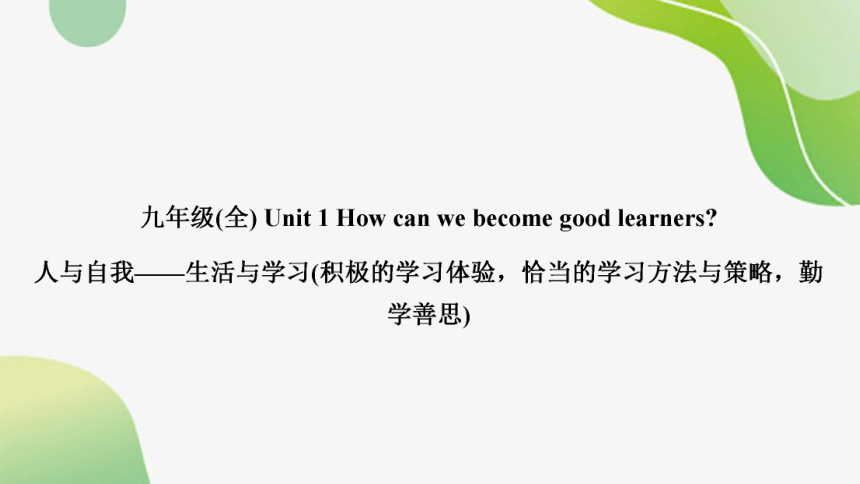
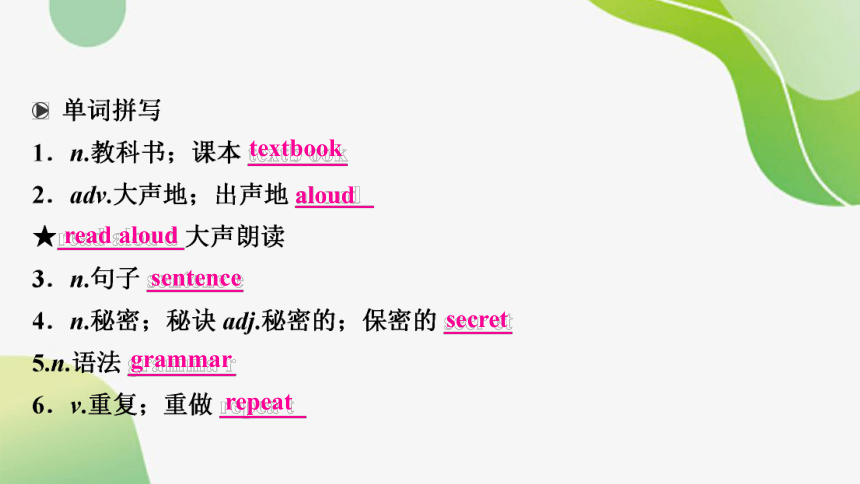
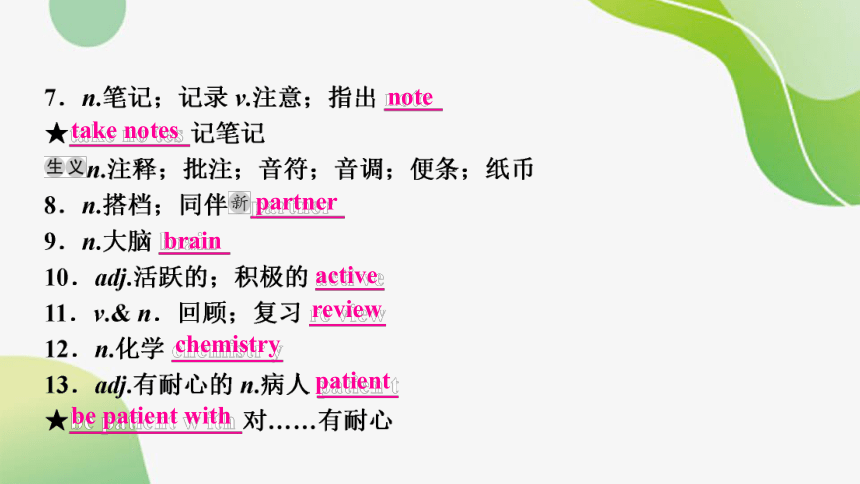
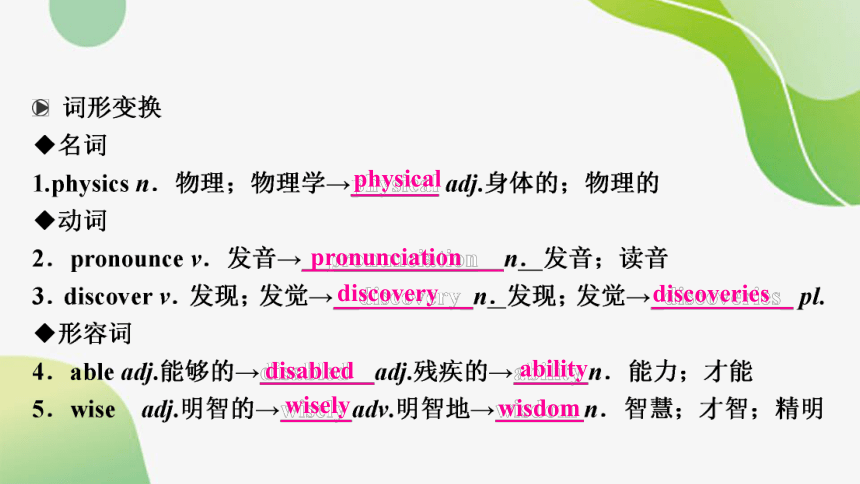

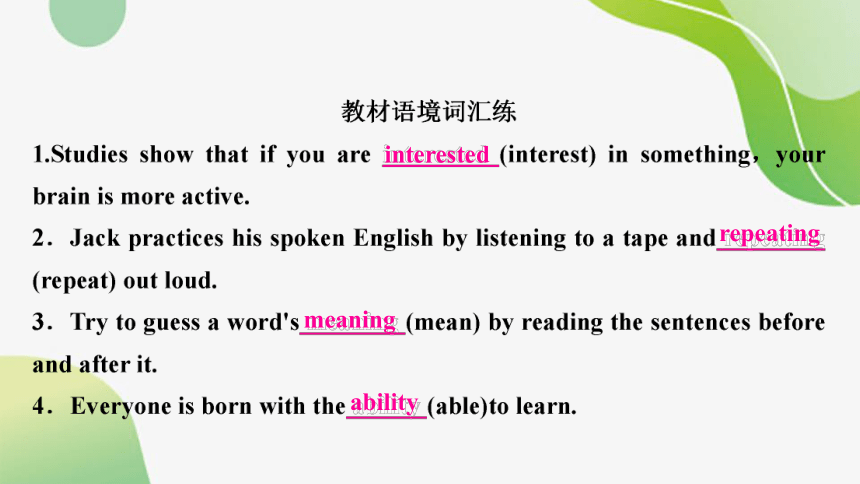
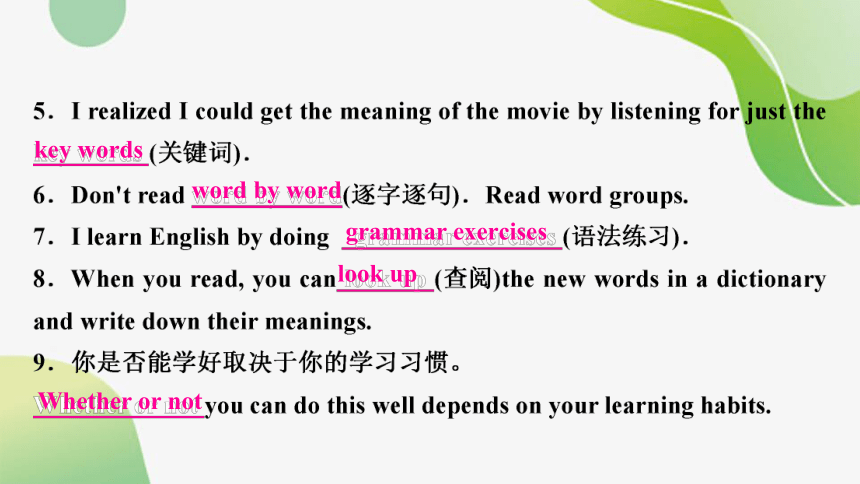
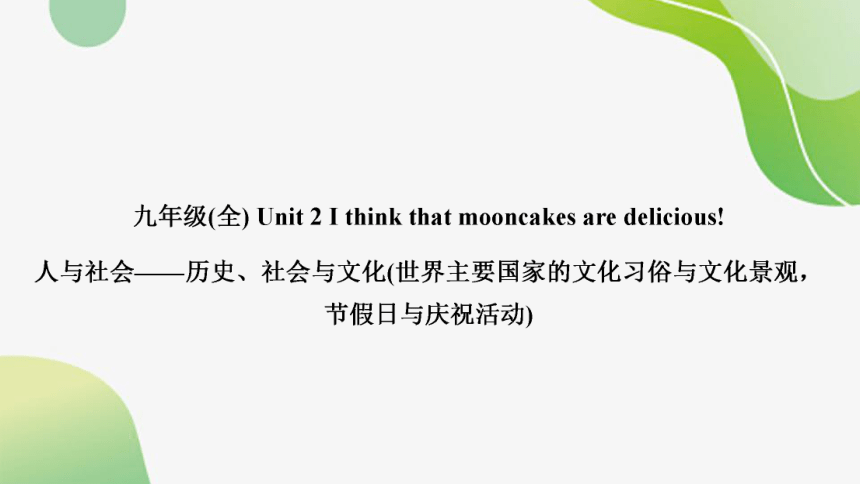
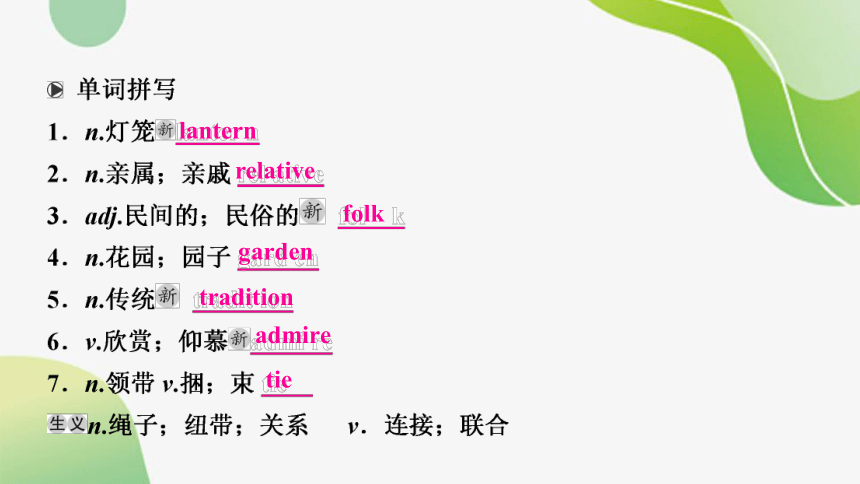
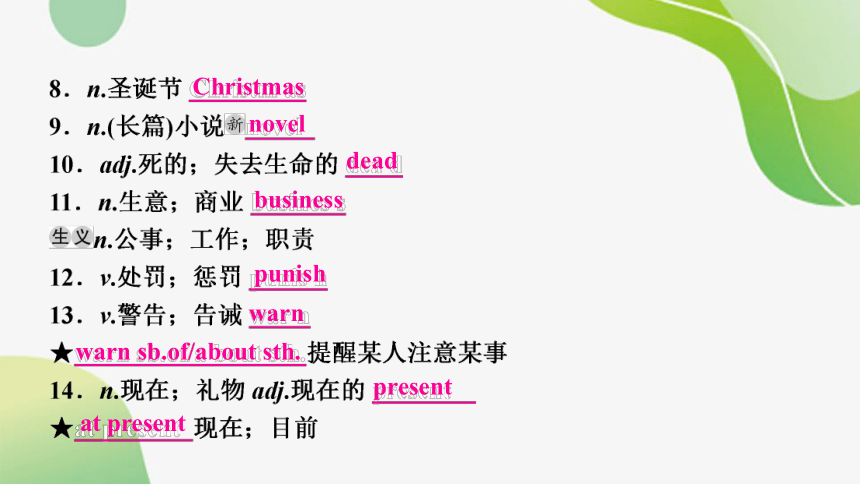
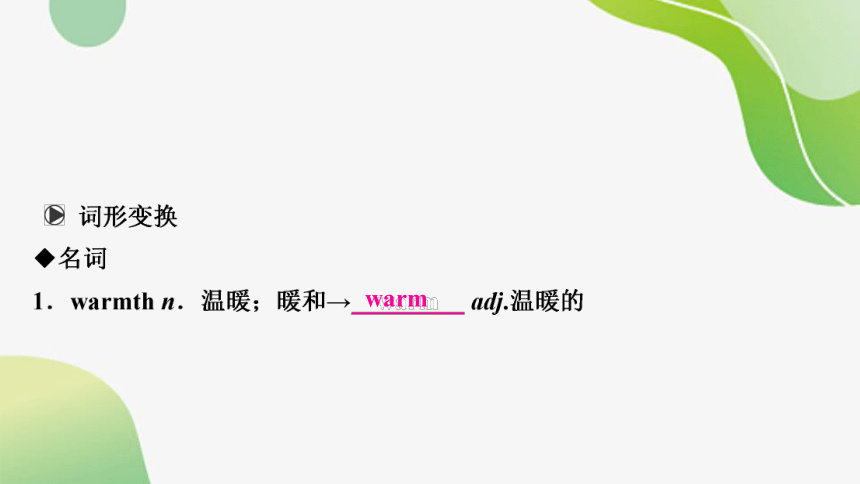
文档简介
(共46张PPT)
九年级Units 1-2
textbook
aloud
read aloud
sentence
secret
grammar
repeat
note
take notes
partner
brain
active
review
chemistry
patient
be patient with
physical
pronunciation
discovery
discoveries
disabled
ability
wisely
wisdom
have conversations with
look up
pay attention to
connect…with
be born with
interested
repeating
meaning
ability
key words
word by word
grammar exercises
look up
Whether or not
lantern
relative
folk
garden
tradition
admire
tie
Christmas
novel
dead
business
punish
warn
warn sb.of/about sth.
present
at present
warm
laid
laying
stole
stolen
spread
lay
lain
lying
put on
lay out
end up
shoot down
treats
warmth
spreading
ties
medicine
hiding
人与自我——生活与学习(积极的学习体验.恰当的学习方法与策略,
勤学善思)
人与社会——历史、社会与文化(世界主要国家的文化习俗与文化景
观、节假日与庆祝活动)
考点 1 辨析loudly,loud与aloud(Unit 1 P2)
考点 词性 含义及用法
loudly 副词 意为“大声地.吵闹地”指人声、敲门声和其他各种声音.强调声音高、喧闹、不悦耳.常与ring, knock, talk等搭配
loud 副词和形容词 意为“喧闹地(的);大声地(的)”.侧重发出的声音大.传得远.一般用来修饰speak, talk, laugh等动词。loud多用于比较级
aloud 副词 意为“出声地.大声地”.强调发出的声音能被听见.与read, call连用时.表示“出声”。aloud没有比较级和最高级
aloud loud loudly
1.Please read the text alou d so that all of us can hear you clearly.
2.The girl told us an interesting story in a lou d voice.
3.(2023·龙东地区改编)It is impolite to speak loud ly in public.
4.Our English teacher suggested that we should read English alou d
(loud) every morning.
aloud
loud
loudly
aloud
考点 2 辨析discover,create,invent与find(Unit 1 P3)
考点 含义 用法
discover 发现;找到 指发现或找到某种自然界本来已存在,但以前未被人类发现或认识的事物或地点,如煤、石油、铁等矿藏以及星系或科学真理等
考点 含义 用法
create 创造;创作 指创作出新的东西.其对象往往是精神上的.如艺术、文学作品中的人物及新的科学领域等.也可指创造出新的具体事物
invent 发明 指发明前所未有的东西.其对象往往是物质性的.尤指科技上的发明创造
find 发现;找到 指偶然发现.或者经过寻找后发现某人具有某物
discovered,create,invented,found
1.(2022·阿坝、甘孜州改编)We learned in school that personal computers
were invent ed in 1971.
2.(2023·贵州改编)Tu Youyou is the Chinese scientist who discover ed an
effective drug against malaria.
3.The purpose of industry(勤劳) is to cr eate wealth.
invented
discovered
create
4.We've foun da a reat new restaurant near the office.
5.(2023·连云港)Paper making is one of the four great inve ntions
(invent) from ancient China.
found
inventions
考点 3 put的常考短语(遂宁:2022.T26)(Unit 2 P10)
如:Please put the cup on.请把杯子放上去。
The actor put on a fine performance.这位演员演得很好。
put away,put up,put on
1.(2023·丹东)On September 1,students put on their new school
uniforms to go to school happily.
2.—(2023·鄂州改编)How was your camping in Sifeng Mountain last
weekend
— It was great. We put up our tents on the top of the mountain and
enjoyed ourselves.
3.The boy put aw ay his school things after he finished his homework.
put on
put up
put away
考点 4 辨析lay与lie(Unit 2 P11)
考点 词性 词义 过去式 过去分词 现在分词
lay v. 放置;下蛋 laid laid laying
lie
v. 躺;位于 lay lain lying
说谎 lied lied lying
n. 谎言 tell a lie说谎
【一言辨异】The man lying there lies to his wife that he laid the
money on the table.躺在那里的那个人对他妻子撒谎说他把钱放在了
桌子上。
【口诀助记】规则的是“说谎”.不规则的是“躺”.“躺”过就下蛋。“下蛋”不规则。
1.(原创)Do you know the cuckoo(杜鹃)la ys(lay)its eggs in other birds'
nests I saw a cuckoo layin g (lay)its eggs yesterday.
2.Are you sure he was lyin g(lie)?I can't believe that of him.
3.I found her lyin g (lie)on the ground when I came back.But I didn't
know how long she had lai n(lie).
4.When I come back home,my parents always la y out my favorite
desserts.
lays
laying
lying
lying
lain
ay
考点 5 辨析die,death,dead与dying(Unit 2 P14)
1.Yuan Longping's de ath made us sad.Although Yuan Longping has
been dea d for more than two years,he still lives in our hearts.(die)
2.Once there was a huge flood,all plants would di e(death).
3.He is looking after his dy ing(die) grandmother in the hospital.
death
dead
die
dying
考点 6 warn的用法(Unit 2 P14)
如:The teacher always warns us not to swim in a river.老师总是告诫我们不要在河里游泳。
I'm warning you for the last time against talking!我最后一次警告你不要说话!
The morning paper warned us of the stormy weather.晨报提醒我们注意暴风雨天气。
1.Although the old are always wa rned(warn) like this,online frauds
(欺骗) still happen to them.
2.(2023·滨州改编)Our parents often warn us not to talk(talk)with
strangers on the Internet.
3.The doctor warned the patient against eati ng(eat) too much.
4.The father warned his son of/ab out fire.
5.The old man warned him tha t he was not allowed to smoke here.
warned
to talk
eating
of/about
that
◆◆话题及语法链接◆◆
单元话题 学会如何学习 节日
语法链接 1.by doing…的使用(讲解见本书P121)
2.感叹句(讲解见本书P129)
3.that,if,whether引导的宾语从句(讲解见本书P144)
话题写作 五育并举(写作见本书P192)
一巩固——课标词汇巩固
一、单句语法填空
1.(2023·达州) He is a warm hearted boy. He is always treating others
with warmth and kindn ess (kind).
2.(2023·本溪)Wh at abeautiful poem it is!
3.(2023·甘肃省卷)My teacher always offers us help pat iently(patient).
4.Don't worry about John.I'm sure he has the abi lity(able) to do the
work well.
kindness
What
patiently
ability
5.If you always give in to others,you will end up fee ling(feel) like a
doormat.
6.(2022·牡丹江改编)He's very kind to others. He treats everyone with
war mth(warm).
7.(2022·眉山改编)Taking not es(note) in class is a good way to help
you review what you have learned.
feeling
warmth
notes
8.(2022·无锡改编)The situation won't be ou t of control. The worst is
behind us.
9.(2023·扬州)In these gard ens(garden), each plant has its own story
to tell.
10.The good news about Tom spr ead(spread) so quickly that
everyone in his town knew it soon.
out
gardens
spread
二、从方框中选择适当的词或短语并用其正确形式填空
review,die,strange,pay attention to,
pronounce,look up,business,watch
1.Parents often tell their children not to talk to strang ers.
2.(2023·连云港)Simon always stays up late.Doctor Ma advises him to
pay attentio n to his health.
3.(2023·青岛)Welcome to our museum.Today,we will rev iew what
we have achieved in our hometown in the past twenty years.
strangers
pay attention to
review
4.(2023·无锡)What have you done to my computer?It's d ead.
5.We learn English by watc hing English programs.
6.(2023·岳阳)The teacher tells students to loo k up new words in a
dictionary.
7.(2023·龙东地区) When we learn English,we must pay attention
to pronoun cing the words correctly.
8.(2023·武汉)Li Xin set up a busi ness to make beautiful art works
by using materials from old cars.
dead
watching
look up
pronouncing
business
二过关——教材语篇过关
单词拼写[九(全) Unit 1 Section B 2b改编]
Everyone is born with the ability to learn.But 1.whet her or not you
can do this well depends on our learning habits. Recently,some
researchers have discovered that successful learners have some good
habits in common. The most common habit is that they have a great
interest in what they learn. Studies show that if you are interested in
something,your brain is more active and it is also easier for you to pay
hether
attention to it for a long time.Good learners often 2.conn ect what they
need to learn with something interesting.In this way,they will not make
themselves bored.
They think practicing and learning from mistakes are very important.
Good learners think about what they are good at and what they need to
practice.Remember,“Use it or lose it” and “Practice makes 3.per fect”.
onnect
erfect
Besides,it's not enough to just study hard.Good learners know the best way they can study.For example,my primary school classmate Linda is a very good learner.She spends a lot of time reviewing what she has learned.She may do this by reading her notes every day or explaining the information to her 4.partn ers.
Learning is a lifelong journey.Please learn 5.wise ly and learn well.
artners
isely
三探究——熟词生义探究
1.note n.笔记;记录 v.注意;指出
生义:A.n.注释 B.n.便条 C.n.纸币
(1)(2022·呼和浩特短文填空)As generations passed,coins were replaced
(代替)with notes and the strings were replaced with envelopes. C
(2)(2023·长沙完形填空)My parents were already asleep, but my mom had
prepared dinner and some cookies for us and left us a note. B
C
B
2.treat v.招待;请(客) n.款待;招待
生义:A.v.把……看作/视为 B.v.医疗;医治
C.v.以……态度/方式对待 D.v.保护;保存
(1)(2023·广西阅读理解D)Some humans kill rhinos(犀牛) for their horns.
They sell horns to those who believe horns have magic powers or can
treat sickness. B
(2)(2022·邵阳短文填空)Treating yourself kindly is helpful. C
(3)(2022·丽水阅读理解B)Some people treat it like a race,but most enjoy
just being outside,getting exercise and having a nice time with others. A
B
C
A
九年级Units 1-2
textbook
aloud
read aloud
sentence
secret
grammar
repeat
note
take notes
partner
brain
active
review
chemistry
patient
be patient with
physical
pronunciation
discovery
discoveries
disabled
ability
wisely
wisdom
have conversations with
look up
pay attention to
connect…with
be born with
interested
repeating
meaning
ability
key words
word by word
grammar exercises
look up
Whether or not
lantern
relative
folk
garden
tradition
admire
tie
Christmas
novel
dead
business
punish
warn
warn sb.of/about sth.
present
at present
warm
laid
laying
stole
stolen
spread
lay
lain
lying
put on
lay out
end up
shoot down
treats
warmth
spreading
ties
medicine
hiding
人与自我——生活与学习(积极的学习体验.恰当的学习方法与策略,
勤学善思)
人与社会——历史、社会与文化(世界主要国家的文化习俗与文化景
观、节假日与庆祝活动)
考点 1 辨析loudly,loud与aloud(Unit 1 P2)
考点 词性 含义及用法
loudly 副词 意为“大声地.吵闹地”指人声、敲门声和其他各种声音.强调声音高、喧闹、不悦耳.常与ring, knock, talk等搭配
loud 副词和形容词 意为“喧闹地(的);大声地(的)”.侧重发出的声音大.传得远.一般用来修饰speak, talk, laugh等动词。loud多用于比较级
aloud 副词 意为“出声地.大声地”.强调发出的声音能被听见.与read, call连用时.表示“出声”。aloud没有比较级和最高级
aloud loud loudly
1.Please read the text alou d so that all of us can hear you clearly.
2.The girl told us an interesting story in a lou d voice.
3.(2023·龙东地区改编)It is impolite to speak loud ly in public.
4.Our English teacher suggested that we should read English alou d
(loud) every morning.
aloud
loud
loudly
aloud
考点 2 辨析discover,create,invent与find(Unit 1 P3)
考点 含义 用法
discover 发现;找到 指发现或找到某种自然界本来已存在,但以前未被人类发现或认识的事物或地点,如煤、石油、铁等矿藏以及星系或科学真理等
考点 含义 用法
create 创造;创作 指创作出新的东西.其对象往往是精神上的.如艺术、文学作品中的人物及新的科学领域等.也可指创造出新的具体事物
invent 发明 指发明前所未有的东西.其对象往往是物质性的.尤指科技上的发明创造
find 发现;找到 指偶然发现.或者经过寻找后发现某人具有某物
discovered,create,invented,found
1.(2022·阿坝、甘孜州改编)We learned in school that personal computers
were invent ed in 1971.
2.(2023·贵州改编)Tu Youyou is the Chinese scientist who discover ed an
effective drug against malaria.
3.The purpose of industry(勤劳) is to cr eate wealth.
invented
discovered
create
4.We've foun da a reat new restaurant near the office.
5.(2023·连云港)Paper making is one of the four great inve ntions
(invent) from ancient China.
found
inventions
考点 3 put的常考短语(遂宁:2022.T26)(Unit 2 P10)
如:Please put the cup on.请把杯子放上去。
The actor put on a fine performance.这位演员演得很好。
put away,put up,put on
1.(2023·丹东)On September 1,students put on their new school
uniforms to go to school happily.
2.—(2023·鄂州改编)How was your camping in Sifeng Mountain last
weekend
— It was great. We put up our tents on the top of the mountain and
enjoyed ourselves.
3.The boy put aw ay his school things after he finished his homework.
put on
put up
put away
考点 4 辨析lay与lie(Unit 2 P11)
考点 词性 词义 过去式 过去分词 现在分词
lay v. 放置;下蛋 laid laid laying
lie
v. 躺;位于 lay lain lying
说谎 lied lied lying
n. 谎言 tell a lie说谎
【一言辨异】The man lying there lies to his wife that he laid the
money on the table.躺在那里的那个人对他妻子撒谎说他把钱放在了
桌子上。
【口诀助记】规则的是“说谎”.不规则的是“躺”.“躺”过就下蛋。“下蛋”不规则。
1.(原创)Do you know the cuckoo(杜鹃)la ys(lay)its eggs in other birds'
nests I saw a cuckoo layin g (lay)its eggs yesterday.
2.Are you sure he was lyin g(lie)?I can't believe that of him.
3.I found her lyin g (lie)on the ground when I came back.But I didn't
know how long she had lai n(lie).
4.When I come back home,my parents always la y out my favorite
desserts.
lays
laying
lying
lying
lain
ay
考点 5 辨析die,death,dead与dying(Unit 2 P14)
1.Yuan Longping's de ath made us sad.Although Yuan Longping has
been dea d for more than two years,he still lives in our hearts.(die)
2.Once there was a huge flood,all plants would di e(death).
3.He is looking after his dy ing(die) grandmother in the hospital.
death
dead
die
dying
考点 6 warn的用法(Unit 2 P14)
如:The teacher always warns us not to swim in a river.老师总是告诫我们不要在河里游泳。
I'm warning you for the last time against talking!我最后一次警告你不要说话!
The morning paper warned us of the stormy weather.晨报提醒我们注意暴风雨天气。
1.Although the old are always wa rned(warn) like this,online frauds
(欺骗) still happen to them.
2.(2023·滨州改编)Our parents often warn us not to talk(talk)with
strangers on the Internet.
3.The doctor warned the patient against eati ng(eat) too much.
4.The father warned his son of/ab out fire.
5.The old man warned him tha t he was not allowed to smoke here.
warned
to talk
eating
of/about
that
◆◆话题及语法链接◆◆
单元话题 学会如何学习 节日
语法链接 1.by doing…的使用(讲解见本书P121)
2.感叹句(讲解见本书P129)
3.that,if,whether引导的宾语从句(讲解见本书P144)
话题写作 五育并举(写作见本书P192)
一巩固——课标词汇巩固
一、单句语法填空
1.(2023·达州) He is a warm hearted boy. He is always treating others
with warmth and kindn ess (kind).
2.(2023·本溪)Wh at abeautiful poem it is!
3.(2023·甘肃省卷)My teacher always offers us help pat iently(patient).
4.Don't worry about John.I'm sure he has the abi lity(able) to do the
work well.
kindness
What
patiently
ability
5.If you always give in to others,you will end up fee ling(feel) like a
doormat.
6.(2022·牡丹江改编)He's very kind to others. He treats everyone with
war mth(warm).
7.(2022·眉山改编)Taking not es(note) in class is a good way to help
you review what you have learned.
feeling
warmth
notes
8.(2022·无锡改编)The situation won't be ou t of control. The worst is
behind us.
9.(2023·扬州)In these gard ens(garden), each plant has its own story
to tell.
10.The good news about Tom spr ead(spread) so quickly that
everyone in his town knew it soon.
out
gardens
spread
二、从方框中选择适当的词或短语并用其正确形式填空
review,die,strange,pay attention to,
pronounce,look up,business,watch
1.Parents often tell their children not to talk to strang ers.
2.(2023·连云港)Simon always stays up late.Doctor Ma advises him to
pay attentio n to his health.
3.(2023·青岛)Welcome to our museum.Today,we will rev iew what
we have achieved in our hometown in the past twenty years.
strangers
pay attention to
review
4.(2023·无锡)What have you done to my computer?It's d ead.
5.We learn English by watc hing English programs.
6.(2023·岳阳)The teacher tells students to loo k up new words in a
dictionary.
7.(2023·龙东地区) When we learn English,we must pay attention
to pronoun cing the words correctly.
8.(2023·武汉)Li Xin set up a busi ness to make beautiful art works
by using materials from old cars.
dead
watching
look up
pronouncing
business
二过关——教材语篇过关
单词拼写[九(全) Unit 1 Section B 2b改编]
Everyone is born with the ability to learn.But 1.whet her or not you
can do this well depends on our learning habits. Recently,some
researchers have discovered that successful learners have some good
habits in common. The most common habit is that they have a great
interest in what they learn. Studies show that if you are interested in
something,your brain is more active and it is also easier for you to pay
hether
attention to it for a long time.Good learners often 2.conn ect what they
need to learn with something interesting.In this way,they will not make
themselves bored.
They think practicing and learning from mistakes are very important.
Good learners think about what they are good at and what they need to
practice.Remember,“Use it or lose it” and “Practice makes 3.per fect”.
onnect
erfect
Besides,it's not enough to just study hard.Good learners know the best way they can study.For example,my primary school classmate Linda is a very good learner.She spends a lot of time reviewing what she has learned.She may do this by reading her notes every day or explaining the information to her 4.partn ers.
Learning is a lifelong journey.Please learn 5.wise ly and learn well.
artners
isely
三探究——熟词生义探究
1.note n.笔记;记录 v.注意;指出
生义:A.n.注释 B.n.便条 C.n.纸币
(1)(2022·呼和浩特短文填空)As generations passed,coins were replaced
(代替)with notes and the strings were replaced with envelopes. C
(2)(2023·长沙完形填空)My parents were already asleep, but my mom had
prepared dinner and some cookies for us and left us a note. B
C
B
2.treat v.招待;请(客) n.款待;招待
生义:A.v.把……看作/视为 B.v.医疗;医治
C.v.以……态度/方式对待 D.v.保护;保存
(1)(2023·广西阅读理解D)Some humans kill rhinos(犀牛) for their horns.
They sell horns to those who believe horns have magic powers or can
treat sickness. B
(2)(2022·邵阳短文填空)Treating yourself kindly is helpful. C
(3)(2022·丽水阅读理解B)Some people treat it like a race,but most enjoy
just being outside,getting exercise and having a nice time with others. A
B
C
A
